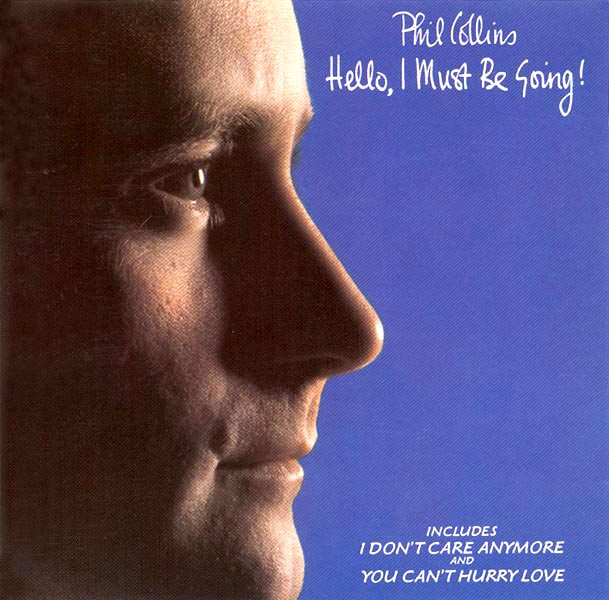
Hello, I Must Be Going (1982)

1.I Don't Care Anymore
2.I Cannot Believe It's True
3.Like China
4.Do You Know, Do You Care
5.You Can't Hurry Love
6.It Don't Matter To Me
7.Thru These Walls
8.Don't Let Him Steal Your Heart Away
9.The West Side
10.Why Can't It Wait 'Til Morning
By the time Hello, I Must Be Going! arrived in 1982, Phil Collins was no longer the unknown drummer-turned-frontman of Genesis. His debut solo effort, Face Value, had been a surprise success, and Genesis had just notched another commercial leap with their 1981 offering Abacab. Still, the full-blown global superstardom that would define his mid-1980s persona was a few years away. With this second outing, Collins dialled back the sonic experimentation of his debut in favour of something more streamlined, but no less personal.
If Face Value had been an open wound, Hello, I Must Be Going! felt more like the bruise that remained — raw in tone, but more contained. The opening track, I Don’t Care Anymore, is arguably one of the strongest pieces in the Collins canon: all brooding keyboards and simmering drums, it plays like a bitter cousin to In the Air Tonight. The vocal delivery is more shout than melody, but the atmosphere is undeniable. It never cracked the charts in any serious way, but its enduring appeal among fans suggests that hit status isn’t the only metric that matters.
Collins doubles down on the venom with Do You Know, Do You Care, another bleak sketch of emotional wreckage backed by synths and thudding percussion. The rage may be less artfully veiled than in previous outings, but there’s no denying the conviction.
Still, Collins was never a one-note artist. Even early in his solo career, he was carving out a parallel reputation as a balladeer. Don’t Let Him Steal Your Heart Away and Why Can’t It Wait ’Til Morning reveal the gentler side of the same broken man — emotionally frayed, yes, but willing to be vulnerable. These are not songs of recovery, but of reckoning. The melodies are more delicate, and the arrangements less confrontational, but the emotional thread remains intact.
True to form, Collins couldn’t resist throwing in a few jazz-inflected pop tunes — brassy, rhythmically nimble affairs that echoed his early flirtations with big band stylings. The West Side, an instrumental, is the most successful of these: a smooth, evocative piece that gives Collins space to flex his arranging skills without overselling the concept. I Cannot Believe It’s True and It Don’t Matter to Me are more conventional, but perfectly agreeable entries in his ever-expanding catalogue of horn-backed pop.
The real curveball arrives with Like China, a track that finds Collins donning the vocal guise of a love-struck adolescent in a performance that’s part character study, part musical sketch comedy. It shouldn’t work — and in lesser hands it wouldn’t — but Collins pulls it off with charm, aided by a muscular guitar line and, naturally, his signature thundering drums.
The album’s biggest commercial moment, however, came from a somewhat unlikely source. His cover of the Supremes’ You Can’t Hurry Love was the first single and, in many respects, the least indicative of what the album had to offer. It’s a perfectly competent throwback, rendered with affection, but it lacks the emotional weight or originality of the surrounding material. Still, given that Collins hadn’t yet become a fixture of Top 40 radio, it was perhaps a prudent choice. That would, of course, change rapidly.
Hello, I Must Be Going! may lack the urgency and raw experimentalism of Face Value, but it stands as an essential chapter in the Collins narrative — an album that consolidates his voice, sharpens his themes, and sets the stage for the mainstream juggernaut he was about to become.
Go back to the main page
Go To Next Review